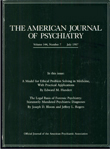Letters to the Editor
TO THE EDITOR: In their article, Strasburger et al. write “In its Jaffe v. Redmond decision in 1996, the U.S. Supreme Court gave unequivocal protection to the confidentiality of the psychotherapeutic relationship. Given the Court's reaffirmation of the primacy of therapeutic confidentiality, over and above other vital interests of society, clinicians would be unwise to compromise this right by carelessly crossing the boundary into the forensic arena.”
Actually, the Supreme Court did not give “unequivocal protection” to the confidentiality of the psychotherapeutic relationship. The Court said, “Although it would be premature to speculate about most future developments in the federal psychotherapist privilege, we do not doubt that there are situations in which the privilege must give way, for example, if a serious threat of harm to the patient or to others can be averted only by means of a disclosure by the therapist.” The Court also said, “Because this is the first case in which we have recognized a psychotherapist privilege, it is neither necessary nor feasible to delineate its full contours in a way that would govern all conceivable future questions in this area” (1).
1. Slovenko R: Psychotherapy and Confidentiality. Springfield, Ill, Charles C Thomas, 1997Google Scholar



